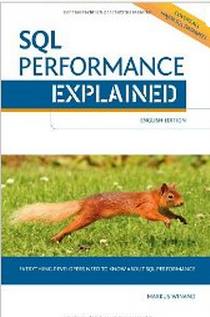| SQL Performance Explained |
|
Author: Markus Winand Covers issues of performance for all major SQL databases. I met author Markus Winand at the 2012 PostgreSQL EU Conference, held in Prague on October 23-26, 2012, and he gave me an English copy of this book, which is also available in German. He asked me a good question about my books: why don't I ever discuss indexing or performance? My reason is simple; I do books on ANSI/ISO Standard SQL and the Standards have never had any mention of access methods. The syntax that everyone uses is “CREATE [<index type>]INDEX <index name> ON <table name> [<product specific options>];” came from the X\Open and SQL Access consortia of vendors. Yes, the ANSI X3H2 Committee and these two groups (which later merged) had a lot of overlapping membership. Click book cover for details from the book's site
Terminology and implementations for indexing varies from product to product. This book gives code in MySQL, Postgres, a little DB2, SQL Server and Oracle, but uses the Oracle terminology. This range of products pretty much covers every indexing option in use today.
The book then proceeds to go into details that programmers my age have forgotten and younger programmers were never taught. The discussion on B-Tree indexes gives the usual description of how they work and balance. But then we get discussions on what causes slow indexes, the limitations of function based indexes, over-indexing, how to search for Ranges and not just simple equality. We look at when and why column order matters. There are a ton of common anti-patterns in DDL that mess up indexing and performance. The discussions of JOIN Operations (Nested Loops, Hash Join, Sort-Merge Join, Clustering Data, Sorting and Grouping, etc) is surprisingly detailed. Perhaps the best material is the debunking of common myths that are spread out in the book: “Indexes Can Degenerate” , “Most Selective First”, "Oracle Cannot Index NULL” and “Dynamic SQL is Slow' are some examples. You will probably be surprised how many things you believe without being conscious of it. This book is definitively worth having in the company library. A pdf ebook is also available. More Details: http://sql-performance-explained.com/
|
|||
| Last Updated ( Friday, 16 November 2012 ) |

